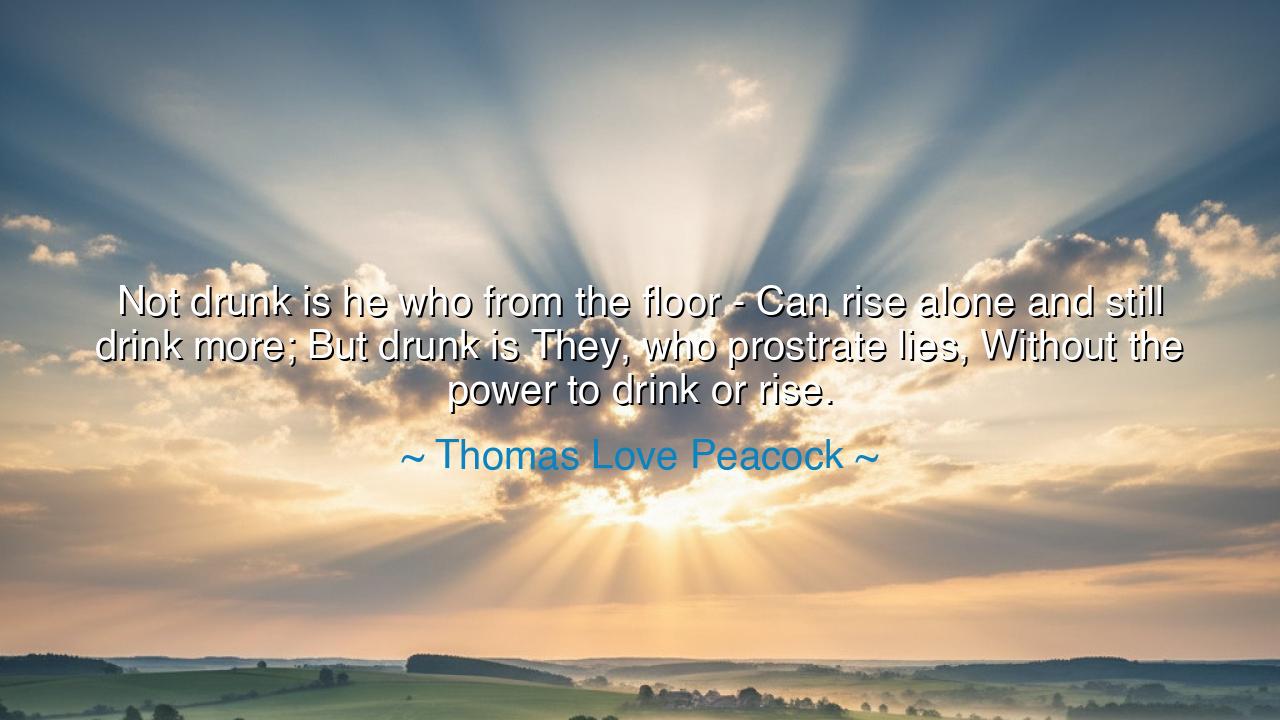
Not drunk is he who from the floor - Can rise alone and still
Not drunk is he who from the floor - Can rise alone and still drink more; But drunk is They, who prostrate lies, Without the power to drink or rise.






"Not drunk is he who from the floor - Can rise alone and still drink more; But drunk is They, who prostrate lies, Without the power to drink or rise." These words by Thomas Love Peacock convey a powerful reflection on the nature of strength, willpower, and the true measure of intoxication—not in the body, but in the mind and soul. The quote challenges conventional notions of what it means to be "drunk," suggesting that true drunkenness is not simply the physical inability to stand, but the state of being spiritually or mentally incapacitated, unable to rise or move forward. It speaks to a deeper, more emotional and moral condition, where one is defeated not by the excess of pleasure, but by the inability to overcome personal or societal weakness.
In the ancient world, the concept of self-mastery was central to the great philosophies that shaped societies. Socrates famously advocated for the examination of life, emphasizing the importance of reason and self-control. To him, true strength lay not in physical prowess or indulgence, but in the ability to govern one's desires, to rise above the temptations of excess. The drunkenness that Socrates warned against was not just the state of being intoxicated by wine or pleasure, but the spiritual intoxication of the soul—being consumed by passions that prevent us from thinking clearly or acting with virtue. Similarly, Plato described the philosopher-king as one who had mastered his own desires and could rise above the corruption and distraction of worldly power.
Peacock’s words remind us that true drunkenness is not simply losing control to a substance, but losing control to one's inner turmoil, weakness, or despair. The ones who "prostrate lies," as Peacock puts it, are those who have surrendered to inertia or self-deception, unable to rise or improve. They are spiritually drunk—not because they cannot drink or physically stand, but because their souls are heavy with despair, defeat, or cowardice. It is the surrender to such conditions that renders them truly incapacitated.
Consider the example of Winston Churchill during World War II, a time when the world seemed on the brink of collapse. Churchill, despite being a heavy drinker at times, found within himself the strength to rise and lead his nation in its darkest hours. The true measure of his resolve was not in the amount of alcohol he consumed, but in his ability to rise—to stand tall in the face of adversity, to continue leading despite the personal demons he faced. In contrast, the true defeat in a situation like this would have been to surrender to the forces of despair and fear, to lie prostrate in the face of overwhelming odds, unable to summon the will to fight back.
In a more everyday sense, Peacock’s quote can also apply to the challenges of personal growth and resilience. Addiction—whether to substances, to negative habits, or to harmful patterns of thinking—can leave one prostrate, unable to move forward. But true strength lies in the ability to rise, to overcome these internal struggles and continue striving, no matter how difficult the path may seem. It is not the fall that defines us, but the ability to rise again, to renew our commitment to self-improvement and discipline.
The lesson from Peacock's words is a call to self-reflection and strength. It is a reminder that the true measure of our power lies not in our ability to indulge, but in our ability to rise from moments of weakness, to move forward in pursuit of greater purpose. When we are faced with personal trials—whether emotional, physical, or moral—the question is not whether we have fallen, but whether we have the strength to rise again. True intoxication, as Peacock suggests, is not the loss of physical control, but the loss of mental and spiritual control.
In our own lives, let us strive to become those who rise—not those who remain lying in the dust of their failures or despair, but those who meet each setback with the strength to move forward. Whether in addiction, grief, or failure, we must remember that it is the act of rising, the commitment to move forward, that defines us. The true test of strength is not in how much we can endure before we fall, but in how much we can endure and still rise again, ready to face what lies ahead with renewed vigor. Let us be sober in mind and heart, strong in will, and ever-ready to stand tall, no matter the challenges we face.






AAdministratorAdministrator
Welcome, honored guests. Please leave a comment, we will respond soon